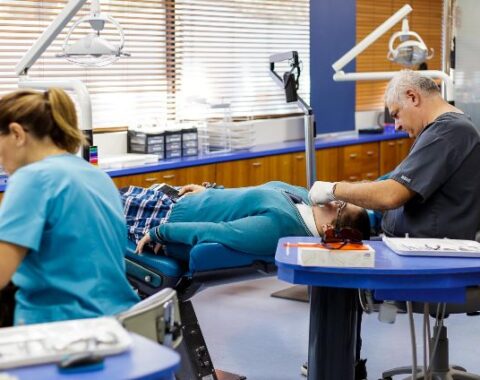Overbites are the most common malocclusion in both children and adults.
Although it sounds common, there are plenty of misconceptions about what constitutes an overbite, what causes an overbite and how it’s treated.
So let’s break everything down and start at the beginning: What is an overbite?
What is an overbite?
Overbites in particular, are when your top teeth overlap your lower teeth. A normal bite has a very slight overlap (about 3 mm) and anything over those 3 mm is considered an overbite.
So, overbites are the more common term for this type of malocclusion. A malocclusion is a Latin for “bad bite”, now there are many other types of malocclusions such as..
- Underbites
- Open bites
- Crossbites
All these “bad bites” have one thing in common, they all have a jaw misalignment. What this means is the two parts of your jaw (your upper and lower) aren’t sitting properly on each other.
But does this really matter?
Yes. It really does matter. Having a misaligned jaw that isn’t in an ideal position can make your life difficult. You could very easily develop difficult eating, chewing, talking, breathing and even sleeping. Misaligned jaws have also been linked to frequent headaches, stomachaches, earaches and more.
Another issue with overbites or deep bite is they can actually affect the lower jaw formation, as it may have difficulty with its’ movement and development. Overbites and deeps bites can also cause premature wear and tear on the teeth too.

What causes an overbite?
In most cases deep bites or overbites are caused by a hereditary condition that affects your jaw and teeth formation. Other factors that can contribute to this incorrect jaw formation include thumb-sucking, extended bottle-feeding and extended pacifier use in children. Things like nail biting and even chewing on pencils can also contribute to a deep bite.
How are overbites treated?
When it comes to treating overbites, this usually calls for a multi-technique approach. Depending on which approach your orthodontist sees as best for you, you may have the following options to choose from to correct your overbite:
- Metal braces
- Clear braces
- Ceramic braces
- Lingual braces
- Clear aligners
- Invisalign
But the first step to correcting your overbite is going to see an orthodontist to be assessed and go over all your options. Fixing your overbite will not only improve the look of your smile but the overall function as well.





